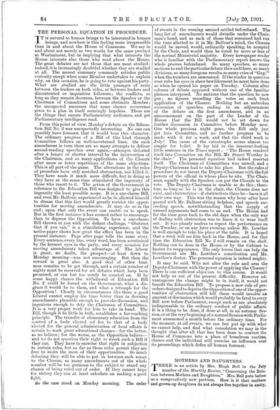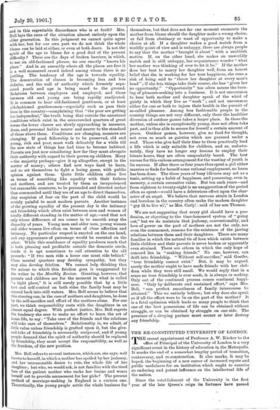MOTHERS AND DAUGHTERS.
/THERE is an article by Mrs. Hugh Bell in the July number of the Monthly Review, "Concerning the Rela- tion between Mothers and Daughters." Mrs. Bell puts before us a comparatively new problem. How is it that mothers and grown-up daughters do not always live together in amity, and in this regrettable discordance who is at fault? Mrs. Bell lays the onus of the situation almost entirely upon the older generation. In this judgment we cannot quite agree with her, but for our own part we do not think the whole blame can be laid at either, or even at both doors. Is not the spirit of the age to blame for a good deal of the present difficulty ? These are the days of broken barriers, in which, to use an old-fashioned phrase, no one exactly "knows his place." And in an assembly where all the places are free it is a well-mannered crowd indeed among whom there is no jostling. The tendency of the age is towards equality. The demarcation of classes is becoming less and less definite, and the wall of authority which formerly sepa- rated youth and age is being razed to the ground. Relations between employers and employed, and those between old and young are being rapidly readjusted. It is common to hear old-fashioned gentlemen, or at least old-fashioned gentlewomen—especially such as pass their lives in the country—complaining that "the poor are getting too independent," the truth being that outside the unnatural conditions which exist in the overcrowded quarters of great towns the lower classes are slowly approaching in manners, dress, and personal habits nearer and nearer to the standard of those above them. Conditions are changing, manners are changing. If good fellowship is to be preserved, old and young, rich and poor, must walk delicately for a while till the new state of things has had time to become habituaL Parents are just now considering how far they must abrogate their authority with regard to their grown-up children. Many —the majority perhaps—give it up altogether, except in the matter of money; others find new ways hard to learn, and so set themselves to fight a losing game, with public opinion against them. Quite little children often live on terms of something like equality with their fathers and mothers, and are treated by them as inexperienced but reasonable creatures, to be persuaded and directed rather than commanded until they are of an age to direct themselves. Any suspicion of fear on the part of the child would be acutely painful to most modern parents. Another instance of the growing equality of the present day is the intimacy and friendship which often exist between men and women of totally different standing in the matter of age,—and that not only where difference of sex comes in to smooth away the disparity of years. Young men and older men, young women and older women live often on terms of close affection and intimacy. No particular respect is exacted on the one hand, and any appearance of patronage would be resented on the other. While this semblance of equality produces much that is both pleasing and profitable outside the domestic circle, inside it is apt sometimes to call attention to the old proverb: "If two men ride a horse one must ride behind." Close mental quarters may develop sympathy, but they may also develop friction. We cannot help thinking that the extent to which this friction goes is exaggerated by the writer in the Monthly Review. Granting, however, that parents and children are for the moment in what is called "a tight place," it is still surely possible that by a little tact and self-control on both sides the family boat may be steered back into still waters. Mrs. Bell seems to believe that this steering can, in the case of mothers and daughters, be done by the self-sacrifice and effort of the mothers alone. For our part, we think responsibility rests with the daughters in an almost equal degree. With perfect justice, Mrs. Bell regrets the tendency she sees to make no effort to learn the art of home life, to say: "Take care of the friends and the relations will take care of themselves." Relationship is, we admit, of little value unless friendship is grafted upon it, but the give- and-take of friendship is necessarily reciprocal, and if young people demand that the spirit of authority should be replaced by friendship, they must accept the responsibility, as well as the freedom, of the new position.
Mrs. Bell refers to several instances, which are, she says, well known to herself, in which a mother has spoiled by her jealousy, and her unreasonable desire to rule, the whole life of her daughter; but who, we would ask, is not familiar with the tired face of the patient mother who racks her brains and wears herself out to provide amusement for her girls ? The present method of marriage-making in England is a curious one. Theoretically, the young people settle the whole business for themselves, but that does not for one moment exonerate the mother from blame should the daughter make a wrong choice, or fail from obstinacy or want of opportunity to make a choice at all. If a daughter makes a good match from a, worldly point of view and is unhappy, there are always people to say that the mother "brought it about with a snobbish motive. If, on the other hand, she makes an unworldly match and is still unhappy, her acquaintance wonder "what her mother was thinking of ever to let it be." If the mother does her best to marry her daughter well, from an honest belief that she is working for her true happiness, she runs a risk of being said to "throw her daughter at every man's head " ; if she lets things take their course, she has "given her no opportunity." " Opportunity " too often means the hurl- ing of pleasure-seeking into a business. It is not uncommon to hear both mother and daughter speak of the whirl of gaiety in which they live as " work " ; and not uncommon either for one or both to injure their health in the pursuit of so-called pleasure. Among less fashionable people in the country things are not very different, only there the healthier diversion of outdoor games takes a larger place. In these the mother, unless she is exceptionally young, does not often take part, and is thus able to secure for herself a certain amount of peace. Outdoor games, however, give no food for thought, not even so much as gaieties which are pursued under a roof. Those who give half their time to them practically lead a life which is only suitable for children, and as, unfortu- nately, they have no longer any lessons to employ their leisure hours, they are often unspeakably bored. The best excuse for this curious arrangement for the wasting of youth is its success. If after three or four years thus spent a girl either marries or finds for herself some rational employment, no harm has been done. The three years of busy idleness may act as a tonic, setting up a habit of happiness, and possessing, even in memory, a certain recreative value. But ten such years—and from eighteen to twenty-eight is no exaggeration of the period often so spent—would have a deleterious effect upon the char- acter of an angel. We believe that nervous strain in London and boredom in the country often make the modern daughter " gey ill to live wi'," as Mrs. Carlyl said of her son Thomas.
We are not suggesting that every girl should have a pro- fession, or objecting to the time-honoured system of "going out," but we do maintain that jealousy, conventionality, and love of power on the part of mothers are not the only, nor even the commonest, reasons for the existence of the jarring relations between them and their daughters. There are many families in which the natural tie of love which exists between little children and their parents is never broken or apparently even strained. There are others in which the only hope of concord lies in "making friends." No one, however, can drift into friendship. "Without self-sacrifice," said Goethe, "true friendship cannot exist." But, it may be argued. surely the mother.. ought to have made friends with her chil- dren while they were still small. We would reply that in a sense no true friendship is ever made, it is always in making. Only out of the continued process comes continual happi- ness. "Only by deliberate and sustained effort," says Mrs. Bell, "can perfect smoothness of family intercourse be attained." This we entirely believe; but why does she speak as if all the effort were to be on the part of the mother ? It is a fatal optimism which leads so many people to think that one of the best possessions of life can be obtained without struggle, or can be obtained by struggle on one side. The presence of a sleeping partner must sooner or later destroy any friendship.



































 Previous page
Previous page